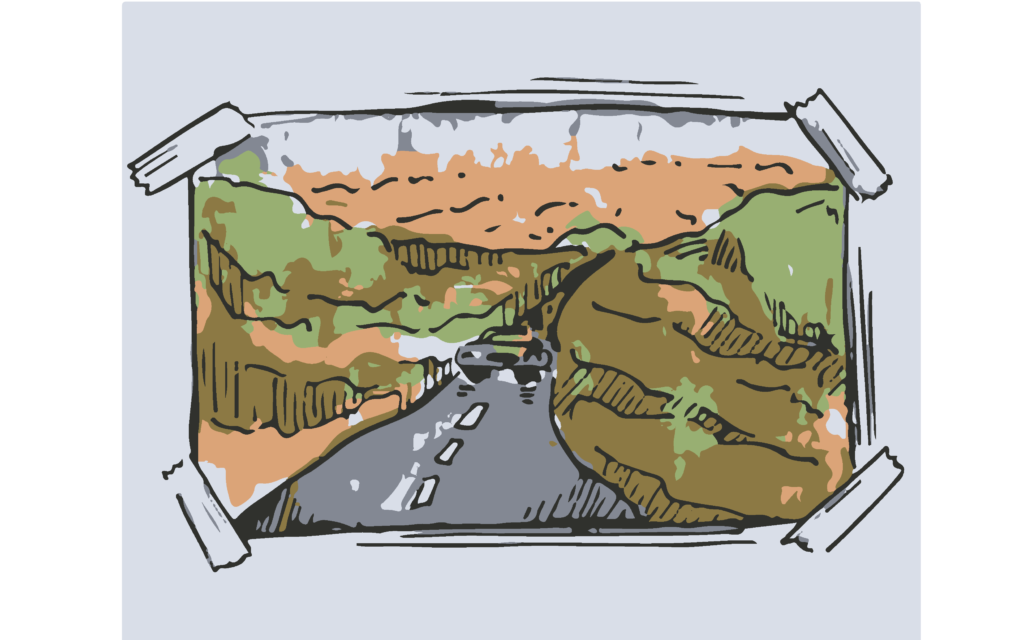It is easy to ignore what is complicated and harder to accept what is true. When I mull over the details of my life before New York, I remember with a visceral, fragmented clarity driving down the Route 4 and Route 208 northern New Jersey highways in my white Hyundai Elantra and, after the battery died, the tan Honda Civic which is now parked in a garage on Keap Street, five blocks from my Brooklyn apartment.
“I’m going for a drive,” I would yell to my mother who was usually on the pull-out couch in the away from my father who was napping in his bedroom or watching TV with our pet parakeet, Speckie. “Be careful,” was always my mother’s response as I grabbed the car keys I ritualistically kept on top of the old Wurlitzer spinet by the front stairs. It was passed down from my Grandmother and was once surrounded by my siblings and me as my mother played the music she loved, though by this point the piano might as well have been a coffee table.
I can picture the bright highway lamps and the gas station attendants hustling from car to car even when it was very late at night. Lush, rust-colored leaves sheathed the roadsides in early fall. When winter came, there was the distinct smell of burning wood coming from fire pits in backyards that belonged to people I will never know. I also recall the discomfort of holding in my pee until I could find a 24-hour diner, a side effect of drinking too many cups of gas station coffee.
What I am trying to get at is that the drives I took in the period ranging from when I was 19 to 24 became my extenuated daily routine. I also need you to know that although I can’t lay my finger on the exact moment my father and I would stop speaking to each other, these were also the years that accumulated into his estrangement of me. And because we lived in the same house, the silence between us became the catalyst for how I would understand on a deep and nuanced level a new meaning for the phrase passing ships in the night.
On these night drives when my father wasn’t home and wasn’t expected to be, I would wonder if he was in the driver’s seat of the car a few spots ahead, driving aimlessly, too. Maybe he was thinking about his life and the choices that brought him to his respective present. Fumbling with my iPod at a stoplight to change the songs, I was curious if my father preferred silence or the radio as a backdrop. Does my father even have a favorite song? If I was driving to the bar after waitressing the night shift, was my father driving to the 7/11 or the gas station or a town far enough away but close enough to stumble back to his room with the bird? When the light turns green, the cars ahead blur down the road, disappearing into the night.
Although meaningful, when I begin to scratch the surface of the answer to what really happened between my father and me, the discoveries are never as pointed or glamorous as all of the songs I’ve heard or movies I’ve seen that describes how significant moments alter our ways of being in the world. Those stories in those songs and movies I’m referring to, ridden with nostalgia, promote the heroin who is struck down by heartbreak and grief and by the conclusion she will emerge from the other side of the burning field, appearing to be wholly transformed by having overcome her personal trauma, gleaming like a jewel.
I’d be lying if I said that the framework in which these stories are expressed hasn’t saved me. In fact, the trope of the protagonist surviving adversity is one to which I am consistently drawn. On many occasions, these narratives have moved me to weep and pray. A recent moment this occurred was when I watched the 2018 drama, Teen Spirit, which is about a teenage girl, Violet, played by Elle Fanning, who lives with her financially struggling mother. Violet dreams of becoming a singer and winds up as a finalist in a teen singing competition that will change her life, which is the film’s plot.
However, the quiet conflict undergirding this story is that Violet’s father has abandoned them. In one scene, Violet’s mother gives her a gold cross necklace that belonged to her father just before Violet heads to London to perform on live television for the final competition round. Her mother believes that on the sanguine chance her father watches the program and sees Violet wearing his cross, he’ll return home.
In the ending scenes, there is a moment in where we see that Violet is deeply affected by her estranged father and she rips off the cross and tosses it backstage as if to exorcise her father from her bones. She then delivers a powerful performance, winning the record deal.
While Violet’s experience resonates with me deeply, and her character depicts perseverance and dignity, character traits that I value, there is a glaring difference in our estranged father’s circumstances. This inequity is one I’ve noted in many, if not all, of the portrayals of the father-daughter estrangement motif. Violet’s father is physically absent. The estrangement meaning separated in both body and language. Between the ages of 19 and 24 when the words, my father, was becoming my estranged father, I saw my estranged father every day.
The cross that Violet’s mother gives her is symbolic of physical absence and a hope for reconciliation. Violet came of age witnessing her mother struggle because of her father’s leaving, yet, for her mother, the moment Violet is about to leave to bring honor to her family and the small town they reside in, also becomes the moment Violet’s accomplishment is used as an opportunity to prove they are worthy of the father’s return, worthy of his love. Violet’s action of ditching the cross before she performs and wins the contest on live television is a powerful rejection of the internalized belief that women need to prove themselves worthy of acceptance and love from a parent or a romantic partner who does not value them in return. Though I do not have a literal “cross to bear” and rip from my neck like Violet, and despite the distinction of my father’s physical presence is an embodiment of abandonment, the drives I took during my experience living with my absent-but-physically-present-father were my own form of rejection of the notion of that need for approval. Driving offered me a space to reflect on who I was as a person and contemplate what kind of person I wanted to grow into.

In silence, my father and I shared the same refrigerator, trafficked through the same hallway, and drank from the same glasses that would be rinsed under the cold and running water. Living this way alongside my father who rarely, if ever, greeted, “How are you?” when we would pass by each other in the driveway, is perhaps the reason why I do not speak often about my relationship with him.
Because the silence was fueled by his physical presence rather than an aperture, it was easier for me to look away, self-preserving to drive as far as I could until I was too tired to think about it, rather than to address the truth that I might never understand with great clarity why my father pulled the plug on our relationship. That while I possess the memory scraps of the events that brought us to this barren place, the recollection will never be linear or exact. Moreover, what is most shocking and unsettling to me about those years, is how the silence between my father and me, and my subsequent silence when probed by people about my father, felt normal, even after I moved away.
In a creative writing night class, I attended a few years after I moved to my current apartment in Williamsburg, we were instructed to write a character sketch where we fictionalized the characteristics and actions of a person we knew in real life. In a panic, because in-class writing prompts are unnerving for me, I began to describe my father.
“Every day you sleep lying down on your stomach, wearing blue jeans. Your room smells of bird shit from the parakeet. You don’t leave the house, except to go on long drives in the afternoon, but you don’t say where. We don’t have each other’s phone numbers.”
After I read my full character sketch one of my classmates said, “Is this person real? They sound sick.”
Although I do not take long drives in my new life in New York, I have encountered new spaces that give me room to think and reflect. There are times when I have felt overwhelmed by the feeling of never fully grasping a clear answer to why my father and I don’t speak, and I take the subway to its line’s last stop. The sensation of being in motion within a confined space in a city that’s overcrowdedness offers a sense of privacy has allowed me to introspect more freely. Where driving offered a sense of freedom in having control over where I was going and when while having to be alert to other cars on the road, stop signs, and traffic lights, riding the subway has given me the freedom to be introspective. I read and write and feel less alone in the privacy of a crowded train.

When I moved to New York at 24, I was gripped with the fairytale-esque belief that this would be the beginning of my real and truest life. It is clear to me now that although much of my becoming has happened in New York, my pension for increasingly lengthier car rides down the Jersey highways near my house was not random. The truth was living in the passing ships of my father and me. Driving afforded me a place to grow, a place of freedom that did not exist in that house. Although the answer to what really happened in those years materializes in modicum, the pieces are true. The most important investigation of human life is to get to the truth, the heart, however inexact this might be. Our real and truest lives are ongoing, flashing within and directly in front of us like the signal of an oncoming train, especially when it is too difficult to look. •




